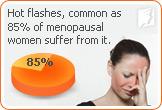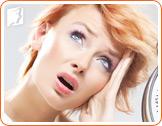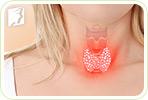
Hot flashes are the most common symptoms women face during menopause; but what is often overlooked is their effect on a woman's body and how they can trigger other menopause symptoms. Up to 85% of menopausal women experience hot flashes. Duration, severity, and frequency vary, but if you're having menopausal hot flashes, then what else do you need to be wary of?
Like all menopausal symptoms, hormonal fluctuations are responsible for hot flashes. Keeping your hormones in balance is important, yet hot flashes can be really distressing.
A List of the Effects Caused by Hot Flashes
Night sweats

These are the nocturnal cousin of hot flashes. Like hot flashes, night sweats have many similar triggers. Night sweats can cause insomnia and irritability, which can be problematic for your daily life.
Loss of libido
As natural estrogen production decreases, many women experience a decrease in sex drive. Hot flashes can lead to a loss of libido, which can lower your self-esteem and put a strain on your relationship. It is important to communicate with your partner so that they understand what you're going through.
Irritability

Knowing that you are suffering from hot flashes can increase tension and stress, which can increase irritability. The disturbances they cause can also drain energy and increase overall frustration.
Mood swings
Similar to irritability, hot flashes can lead to mood swings. These fluctuating moods can put a strain on your relationships, both personal and professional.
Fatigue
One of the more common symptoms of menopause, fatigue can sometimes be triggered through chronic hot flashes and night sweats, which can hinder a good night's sleep. Long term fatigue can lead to poor work performance and strains on relationships.
Difficulty concentrating

When suffering from hot flashes you are more likely to have trouble concentrating. Your symptoms can take over your mind, which can hinder your ability to focus or concentrate on your daily life.
Headaches
Headaches, one of the myriad of symptoms you get from hot flashes, can be attributed to other factors, including lack of sleep and, of course, hot flashes. Headaches, whether tension or migraine, can be incredibly straining on a woman who is already dealing with hot flashes and other menopausal symptoms.
More about Hot Flashes
Hot flashes, one of the most common symptoms of menopause, can trigger other menopausal symptoms. Changing your lifestyle and adding exercise to your diet, alongside herbal supplements, is often the best way to deal with menopause symptoms.
Sources
- Boston Women's Health Collective. "Hot Flashes, Night Sweats, and Sleep Disturbances." Our Bodies, Ourselves, 2006.
- The National Institute of Health. "Signs of the Menopausal Transition." www.nih.gov
- Von Muhlen, DG, et al. "A community-based study of menopause symptoms and estrogen replacement in older women." Maturitas. Sept 1995; 22(2): 71-8.



